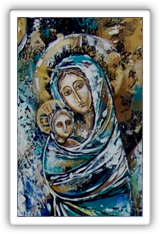|
|
Comprehending Medjugorje : Original Documents And Conversations with Arnaud Dumouch
Preface
Reference (Croatian Edition) :
Daria Klanac, Razumjeti Međugorje : Izvorni dokumenti i razgovor s teologom Arnaudom Dumouchom, Informativni centar Mir, Međugorje, 2009 [ISBN 978-9958-36-033-6], Predgovor, pages 7 à 9 de l’édition croate.
English Translation by Duško Čondić
Preface
by Fra Ivan Dugandžić
Daria Klanac is well known to all who are interested in the problematic challenge associated with Medjugorje. With her first arrival from Canada to Medjugorje in 1984, not only did her strong experience as a believer as well as her serious investigations of the initial stages of the appearances of the Gospa [our Lady]. From that time forward, she has accompanied groups of pilgrims from Canada to Medjugorje more than ninety times; meanwhile, she also began to engage in gathering materials as well as researching the very first days of the apparitions in the belief that those first days are precisely the most authoritative font of information needed to arrive at an objective conclusion about the entire phenomenon known as Medjugorje. Thanks to her desire to know and her great tenacity, Daria managed to come across some precious audio-cassettes whereon were recorded conversations held on the very first days of the apparitions, as engaged in by the Franciscans residing in Medjugorje. She transcribed those conversations and translated them into French, thus protecting them from being lost to posterity. The fruit of her investigations resulted in her first book “At the Sources of Medjugorje” (1998). Along with her investigations, she also kept abreast of the reactions of the Church and the public to the events occurring in Medjugorje, as well as to continue gathering literature, both, for and against the apparitions. Without taking either side, she endeavored to examine the matter objectively so as to offer a sober and measured judgement. The fruit of that effort resulted in her second book: “Medjugorje, a Response to Objections” (2001).
Even after having published her second book, Daria did not cease to investigate Medjugorje. What is more, she sensed that it is necessary to go beyond that which she had achieved in her previous books. In her third book, she wishes “to leave more room for evaluation, deeper and more serious contemplation of all points of view regarding these apparitions that have defined our time.” Along with that, she stresses that she in no manner wishes to impede the ultimate judgement of the Church which is still awaited; rather, she wishes to participate in the discussion about Medjugorje while being faithful and obedient to the Church. Aware that she herself is not sufficiently schooled theologically so as to contemplate the occurrences in Medjugorje, she chose a competent collaborator in the person of the French theologian, Arnaud Dumouch; hence, the central portion of the work assumes the character of a dialog, that is, a question and answer format in which all which is thought to represent great difficulty as regards the phenomenon of Medjugorje is discussed.
Daria says of her fellow-collaborator that he is a “theologian of Hope,” as she stresses his exceptional virtues, namely, his objectivity, openness, and humility. Reading the text, one conclude that, indeed, one is dealing with a highly educated and, at the same time, a very humble theologian—alas, a somewhat infrequent quality among them. Dumouch approaches each question posed to him with humble openness to the Spirit, and he endeavors to respond to the question posed as fully and objectively as he can. In the same manner that Daria did not attempt to skirt even the most unpleasant or complex questions associated with the phenomenon of Medjugorje, so, too, Dumouch does not avoid answering such uncomfortable and thorny questions. Such questions deal with issues such as the theological nature of the apparitions, the visionaries themselves, the messages, the promise of a sign, the Franciscans, the Bishop, and even the Church which eventually must pass judgement on the matter. In all Dumouch’s responses, one always recognizes the spirit of the Gospels and of Hope. The purpose of his responses is not to acknowledge one side as right, while condemning the other; rather, his intent is to open the eyes of the reader to a sensitive supernatural reality where one cannot offer easy off-handed judgements, and, most certainly, not a priori judgements that are one-sided. Dumouch speaks in the name of the Church (as a loyal and faithful member), a Church wherein all must be aware of one’s responsibility for all that occurs within her.
In conclusion, it is not unimportant to mention that the author and her co-author are Christian laymen and that they are in no manner directly associated with Medjugorje. This, in itself, is a more certain guarantee of the works objectivity. As laymen, they are not in the least burdened by the clerical animosity that they find to be inexplicable, that is, the animosity that sometimes is at play between the local Bishop and the Franciscans. As a result, they are able to view the matter more broadly and with a greater degree of tolerance. Also, living a great distance from Medjugorje, they are also not colored by any sort of personal interests or with any sort of personal ties whatsoever with any of the participants in the Međugorlje phenomenon; hence, their judgement can be objective and well balanced.
All of the above serve as reasons why we can, with joy, welcome the thrid book about Medjugorje by Daria Klanac, and also wish that it finds a multitude of readers, and that it serves as an aid such that they can arrive at a just judgement about all that has continued to occur for more than twenty-eight years in that unique parish, while, of course, leaving the final judgement to the Church, as the author herself emphasizes.
Fra Ivan Dugandžić
